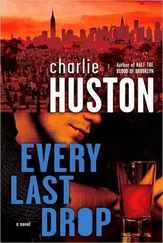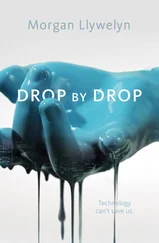Merry was saying, “No way. Uh-uh.”
Reba drove a sliver of wood through the plastic to hold it in place. “Jiminy said you pushed him. Everybody said so-Bill, Verbie, even Weird George. And Pan. I hear Pan was involved too.”
“Well, if I did, I didn't mean to. I really like him, you know that. But sometimes he gets so fucking, I don't know, _stubborn,__ like he's six instead of nineteen, and as far as Ronnie's concerned, yes, I did go up to his tent. And we got high. That's all. Not that it's anybody's business.”
“What about Jiminy's? Isn't it his business? Didn't I hear you say you were going to try to make that work, no more sleeping around and da-da-da?”
Merry looked up from the other end of the sheet, disrupting the flow of it, and Star could see the light pooling like oil in the dark folds of plastic. At the far end of the garden was the original cabin, the one Norm's uncle had left behind, the logs gone gray with age, trees growing out of the sod of the roof. Beyond that was the new meeting hall, square all around and roofless still, the logs yellow as an animal's teeth where the bark had been stripped away, and a dozen people clambering all over it with saws, axes, hammers. Star could hear the muffled thump of metal on wood, the shriek of the chainsaw, the occasional curse. “I don't know,” Merry said, “I may be mistaken, but wasn't that you I saw coming out of the bushes with Deuce two nights ago? Upriver? Late? With a smile on your face?”
“We were looking for blueberries, that's all. Because if you think-”
Star could see she was lying, not that it made any difference. If Reba wanted to be a hypocrite, that was her business. And Alfredo's. She smoothed plastic. Hammered in a stake. She had a view of the hacked-over field behind them, stumps bleeding all the way down to the river, and she saw Che coming before she heard him, and they all three heard him at once, his voice raised in an unholy shriek. “Uh, Reba, I think Che needs you,” she was saying, and there he was, livid protoplasm, upright and outraged, coming across the field from the river holding one limp hand out before him and wailing, Sunshine trailing behind.
Between gasps he shouted out her name-“Reba! Reba!”-because even in his extremity, whatever it was, he knew enough not to call her _Mom__ like some mind-controlled zombie kid out of a suburban development. He was a brat, undernourished, unschooled, stoned before his time, but at least he knew that much. Reba got to her feet, her face gone stiff. She was wearing a beige-and-yellow western shirt with embroidered pockets, and she took a minute to dig her cigarettes out of one pocket and a lighter from the other, and even as Che came running to her to bury his screaming face in the _V__ of her conjoined thighs she was exhaling the first blue puff of smoke. “What is it now?” she demanded.
He couldn't tell her. He just stamped his feet till the plastic sagged and the stakes came up and she reached down and took him in her arms while Sunshine looked on with her hands on her hips and rehearsed her own version of events. Naked, browned, pocked with the angry red eruptions of a hundred bug bites, she was the original wild child, suckled by wolves, fed on honey-dew and the milk of paradise. Her hair was kinked, tangled, sun-bleached. Her eyes were watchful. “I did not,” she insisted as her brother whined his accusations into their mother's crotch. “He did. He was the one.”
There was a shout in the distance. Star ignored it. They were busy here, couldn't people see that? There was work to be done and she had no patience for screaming children or the catastrophe of the hour-and they were regular as clockwork, one per hour, on the hour-and couldn't somebody find the time to sit down and read these kids a _book?__ Was that too much to ask?
But the shouts were furious now, mounting-“Star!” they were calling, “Star!”-and she jerked her head round to see a knot of people running toward the goat pen with the two yellow dogs out front in a surge of kneading yellow muscle. Reba threw down her cigarette. Che's sobs died in his throat, an ache, a quiver, then nothing. Star rose to her feet at the same time Merry did, the black plastic rippling like a dark sea beneath them.
The goats were in a rudimentary pen made of eight-foot lengths of birch and cottonwood lashed to posts five feet high, a pen they planned to roof and convert to a barn for winter-and there'd been a whole storm of debate about that, because nobody really featured the goats stinking and bleating and dropping their pellets _inside__ the cabins, yet they didn't really want to put the work in when there were infinitely more important things to do, like erect cabins, install stoves and split a hundred cords of wood so they wouldn't _freeze their fucking asses off__ come winter. Star understood what the priorities were, but she didn't care. She'd gone ahead and built the pen herself, with a hatchet and a coil of old clothesline, and the tent she and Marco shared was pitched up against it so she could keep track of her charges in the gray wash of night.
The dogs were barking now, panting breathless gasps of assertion and rage that rang out over the river and rebounded again, and one of them-it was Frodo-was trying to clamber up into the pen. She dropped the hammer at her feet and took off running.
Everybody was shouting, crowding in against the rail as if they were at a rodeo, Frodo's hind end perched there statue-like for an instant and then disappearing even as Freak scrabbled at the crossbars and fell back. What it was, she couldn't see, the goats bleating-screaming, screaming in a key she'd never before heard or imagined-and a blur of motion visible through the gaps, now here, now there, torn from one side of the pen to the other. And when she was there, everything in an uproar, Jiminy bolting for Pan's tent to get a gun and Marco and Alfredo straddling the rail with clubs in their hands, she still couldn't apprehend what she was seeing, as if there were some essential gap between her eyes and the part of her brain that processed visual information. “It's a bear!” somebody shouted.
The white of the goats, the yellow of the dog, the wild shifting raging _brownness__ of this thing that didn't belong there in the pen, that didn't compute, that was no bear at all but something else entirely, claws, teeth and fur in a fury of grinding perpetual motion and a keening sharpedged growl that never faltered, and by the time Marco and Alfredo waded in on it with their clubs the goats were dead and gutted and Frodo was lying there in the dirt with his throat torn out and this thing, this emanation of the deepest hole in the blackest part of the last and wildest stronghold of the hills that bristled round her like breastworks, faced them down and in one leap was gone, a dark rumor in the high weed out beyond the silent pen. And later, even when she knew what it was-_Gulo luscus,__ the glutton, the wolverine, the big buffed-up weasel that was so blood-crazed it had been known to drive grizzlies off their kills, she still didn't understand. All she knew was that Ronnie had the guns downriver-all three of them-and that there would be no goats to tend, not anymore, and no milk, no yogurt, no cheese. There was a party, led by Weird George, Mendocino Bill and Norm himself, that wanted to butcher the goats and make use of the meat-the whole business regrettable, sure, a real bummer, but why let the meat go to waste, that was their thinking-but she came at them like that thing itself, raging, absolutely raging, and “Why not skin Frodo, then,” she said. “Why not eat him?”
She dug the holes herself. Marco stood off at a distance with a solemn face and two empty dangling hands, but she wouldn't let him help. The ground was like rock. The mosquitoes drained her. Sweating till her eyes stung and the ends of her hair clung like tentacles at her throat, she dragged the carcasses of the goats-of Amanda and Dewlap, and yes, she could tell them apart now, even at this late hour when it no longer mattered and their eyes were closed on the world-dragged them across the yard and buried them.
Читать дальше












